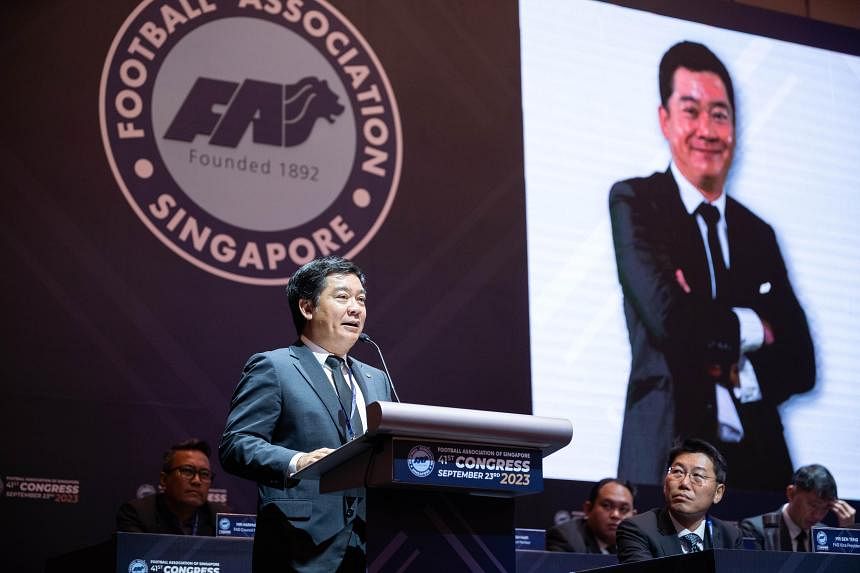SINGAPORE – Football Association of Singapore (FAS) president Bernard Tan on Saturday described the state of the local game as “running on the spot” and outlined three areas to address to get it out of the doldrums.
In recent years, the national team have suffered several early exits at the Asean Football Federation (AFF) Championship while the Young Lions have endured multiple disastrous campaigns at the SEA Games.
Tan, who was appointed president for the remainder of the 2022-2025 term at the FAS’ annual congress at Sheraton Towers, called for more funds and deeper private sector involvement in Singapore football, a greater synergy among stakeholders within the footballing ecosystem and the need for better infrastructure, specifically more football pitches.
Several times during his speech, Tan indicated that hard truths were needed given the current circumstances as the attendees – including AFF president Major General Khiev Sameth from Cambodia, representatives from the Asian Football Confederation, Fifa, Sport Singapore (SportSG) and FAS council members and representatives from its affiliates – listened on in silence.
Tan, the country president (Singapore) of Indonesian conglomerate Sinar Mas and a retired army brigadier-general, was the sole candidate for the election. He later said in the post-event press conference: “We are standing still, running on the spot. We need to move into a jog, eventually a run and hopefully into a sprint. To get that change requires us to do the difficult things.”
He added: “If we want to succeed, it needs to be backed up with resources, two types of it. One is obviously... money, but the other one is also investments in infrastructure which requires obviously more than just money.
“It requires setting aside certain areas for building of infrastructure. So the combination of two are very crucial. The traditional way that we have relied on funding at the FAS is through grants but we need to go beyond that.”
In the FAS’ annual report for the year ended March 2023, it received $22.35 million of funding from national agency SportSG and $1.23 million from sponsorships. Its total expenses in that period were $27.9 million, which included spending on local competitions like the Singapore Premier League.
In comparison, the All India Football Federation’s budget for the upcoming season is Rs 134 crore (S$22.01 million) while in 2021, the Philippine Football Federation’s budget was PHP 268 million (S$6.4 million), according to media reports.
The Singapore Government’s involvement in local football has increased in recent years, especially under the Unleash The Roar! project which was launched in 2021 to raise the standards of football here.
Tan, 57, noted that new initiatives like the Singapore Youth League – kicking off in 2024 – will inevitably create greater demand for playing fields. While acknowledging SportSG and the FAS’ efforts to optimise the use of limited football fields here, he urged wider stakeholders, particularly from the public sector, to actively participate in initiatives aimed at addressing this challenge.
Having previously served as vice-president since 2013 and deputy president from 2017, he became acting president last September after Lim Kia Tong’s death. Since then, the Lions lost 4-1 to Malaysia at the AFF Championship in January and did not advance from the group stage. In May, the Under-22 team were thrashed 7-0 by Malaysia at the SEA Games.
In the short term, Tan wants the Lions to show that they can be competitive in the region again.
“We want to bring Singapore football to a place where I think Singaporeans expect us to be. The focus is to be competitive in Asean and it will help us to reach the dream that we want to achieve,” he said.
“To do so... we need to take cognisance of what other countries are doing. They are running, and in Vietnam’s case, sprinting. If we want to be competitive in Asean, we need to run at that pace or even faster. That’s the challenge that we have for the football ecosystem in Singapore.”


